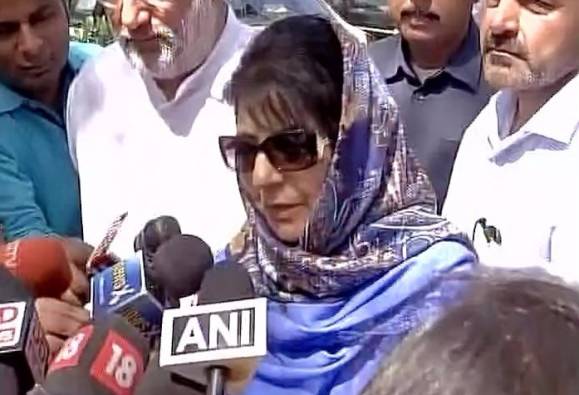Do Not Send Out Negative Signals, JK is a Sensitive State: CM Mehbooba Mufti Tries to Convince Centre

NEW DELHI: Chief Minister, Mehbooba Mufti said Jammu and Kashmir is too sensitive a state for Government of India to afford being distracted by issues which seem to trivialize its special position in the union as she beseeched for special care and attention towards the state.
She said her task becomes difficult when certain groups in other parts of India try to challenge the special relationship of J&K with the rest of the country and question the same which is part of the Constitution of India.
“Such acts, besides wasting our energy, send negative signals and vitiate the peaceful atmosphere in the state,” Mehbooba said while speaking during the annual Joint Conference of Chief Ministers of the States and Chief Justices of the High Courts at Vigyan Bhawan here.
The conference was inaugurated by the Prime Minister, Narendra Modi, and was also attended by Chief Justice of India, Justice T. S. Thakur, Union Minister of Law & Justice, Sadananda Gowda and the State Minister of Law, Justice & RDD, Abdul Haq Khan.
Mehbooba said people in J&K are still nursing “old wounds inflicted by horrific tales of misfortune and tragedy”. This, she added, not only escalates a feeling of distrust in the state but also discredits the mainstream parties in the eyes of the voters who put their full faith in their representatives under odd circumstances.
Participating in the structured discussions on improving justice delivery system in the country, the chief minister spoke about years of political strife in J&K resulting in huge loss of life and property.
“The government, along with other mainstream political parties, is trying to bring back J&K out of this morass to the best of its ability, which takes a great toll on its energy and resources,” she said.
Mehbooba sought the backing of people of India in helping tide over the difficult challenges confronting J&K, which she said had pegged it back on the development index as compared to other states in the country.
As chief minister, she said, her prime objective will be to restore the balance and put J&K firmly on the path of development and added that she will leave no stone unturned in bringing back smiles on the faces of the people of the state.
Responding to the observations made by Mehbooba, Justice Thakur welcomed her participation in the conference after taking over as the Chief Minister of the state.
“The whole country is at your back and realizes the difficult situation you are facing in your state,” he told the chief minister.
The chief minister said she has full faith in the wisdom of the country’s judicial system, “which has proved time and again their sensitivities to the special needs of the state”.
She thanked the Chief Justice and admired various judicial interventions made from time-to-time, especially in fast-tracking clearance of insurance claims of the people devastated by the floods of 2014.
Mehbooba also batted for setting up of a National Law University in J&K to impart training and advanced education to students and researchers so that quality of justice delivery system improves in the state.
J&K is one of the states which doesn’t have a National Law University yet.
Referring to the proposal sent by J&K government in this regard, Justice Thakur highlighted the need for establishing national law universities in each state to improve quality of justice delivered to the people.
He, however, requested the state governments not to procrastinate over release of grants, which in any case do not exceed Rs. 2 to 3 crore, as this gives rise to demand for bringing all national law universities under Central regime.
During the conference, many threadbare discussions were held on issues pertaining to speedy and affordable delivery of justice and removal of pendency in the judicial system.
The issues resolved included strengthening Monitoring-cum-Coordination Committee of various state governments by inclusion of High Court judges so that funds sanctioned for infrastructure upgrade are optimally utilised; disposing off cases which are more than five years old in a mission mode; review of cadre strength after assessing the entire requirement of vacancies to be filled in a time-bound manner; and establishing morning, evening and holiday courts to trim the huge pendency of cases.
The other matters deliberated upon in detail comprise filling up vacancies in jails so that inmates, mostly under-trials, are able to live in better conditions, computerisation and digitisation in all courts by shifting to service provider regime that guarantees data sovereignty, establishing legal aid cells and juvenile homes.
(Courtesy Rising Kashmir)



